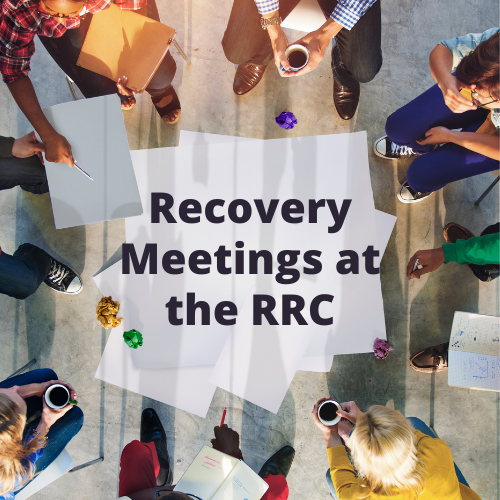
Recovery Meetings at the RRC
What recovery meetings are held at the RRC (Recovery Resource Center)?
Looking for recovery meetings can be overwhelming at times, especially in early recovery. There’s no “one size fits all” and there are so many different types. Some recovery meetings are faith based while some focus on abstinence. So how doesn’t a person narrow down which one(s) to try? Here is a list that outlines some that are held at the RRC.
12 Step Meetings
As Bill Sees It (Alcoholics Anonymous)
This is an open meeting that is available to anyone interested in Alcoholics Anonymous’ program of recovery from alcohol use disorder (alcoholism). Typically a speaker will read aloud from the book As Bill Sees It and a discussion takes place around the room.
A New Pair of Glasses (Alcoholics Anonymous)
AA member, Chuck C. wrote the book, A New Pair of Glasses and it works through the 12 steps of the Big Book (Alcoholics Anonymous). This meeting will talk through some of the book’s passages, prayers and reflections and what they mean to your recovery and your life.
Narcotics Anonymous (NA)
Narcotics Anonymous uses a 12-step model developed for people with a variety of substance use disorders.
Heroin Anonymous (HA)
This recovery meeting is similar to the principles of Alcoholics Anonymous. HA is a fellowship of people whose drug of choice was/is heroin and meet to help each other practice complete abstinence from all drugs and alcohol.
Dual Recovery Anonymous (DRA)
Dual Recovery Anonymous is an independent, nonprofessional, Twelve Step, self-help meeting for people with a dual diagnosis. Individuals that attend DRA are chemically dependent and also affected by an emotional or psychiatric illness. The DRA approach to dual recovery focuses on a simple set of ideas and steps and is suggestions for recovery rather than a set of rules. They encourage individuals to find their own personal recovery, the one that is most meaningful. They are meant to support those who wish to bring a spiritual dimension to our dual recovery. The DRA program is worked on a day-by-day basis.
United Anonymous
This unique recovery meeting follows the same principles as AA and NA but the difference is that anyone is welcome regardless of their substance of choice and no one is turned away. There are AA and NA readings during the beginning of each meeting and members are welcome to solicit feedback from each other.
Recovery Dharma
This peer-led community uses the Buddhist practices of mediation, wisdom, self-inquiry, compassion and community tools for recovery and healing. Additionally they believe that recovery is about each individual finding their own inner wisdom and their own path.
Marijuana Anonymous
This program is a 12-step meeting for individuals that want to share experience and strength in overcoming a substance use disorder with marijuana.
Criminals Anonymous Fellowship
This is a recovery fellowship of men, women, youth, survivors and their families that commits to supporting and living a crime-free lifestyle that is also free of guilt or shame.
Co-Dependents Anonymous (CoDA)
Co-Dependents Anonymous is a twelve-step program for people who share a common desire to develop functional and healthy relationships.
12 by 12 on 99
Individuals that attend will dive into the book: Twelve Steps and Twelve Traditions. After reading a page together, they discuss what it means to them. The book explains the 24 basic principles of Alcoholics Anonymous and their application. Additionally, the book dedicates a chapter to each step and each tradition, providing a detailed interpretation of these principles for personal recovery and the organization of the group
SMART Recovery
SMART stands for Self-Management and Recovery Training. It’s a transformative method of moving from addictive substances and negative behaviors to a life of positive self-regard and willingness to change. During the support meetings, participants design and implement their own recovery plan to create a more balanced, purposeful, fulfilling, and meaningful life.
Recovery is a personal journey and there is no perfect solution for everyone. While recovery meetings help many, it may not fit some and that is completely ok. Others find help and solace in their religious and spiritual beliefs while some choose to walk on a path with their self.
There may also be a time individuals need the guidance of a professional substance use or mental health facility. That is where Lifeline Connections can help.
How to get help
Lifeline Connections offers an integrated, holistic approach that includes therapy and case management. In addition, our doctors specialize in the treatment of co-occurring mental health and substance use disorders.
Above all, they can work to design a custom plan for wellness. Additionally, secure treatment is over the phone or computer with telehealth, providing coping skills for grief, loss, depression and anxiety. In short, they will work with you one-on-one to get you feeling better. So, contact us and reclaim your life.
